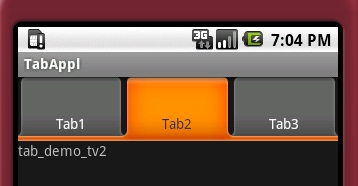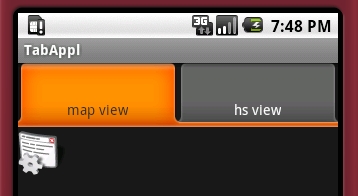1. 最简单的TabHost,Tab来自于layout下的元素 (只从1个Layout中取数据)
(1)效果图

(2)代码
1)tab_demo.xml
<?xml version="1.0" encoding="utf-8"?> <FrameLayout xmlns:android="http://schemas.android.com/apk/res/android" android:orientation="vertical" android:layout_width="fill_parent" android:layout_height="fill_parent" > <TextView android:id="@+id/tab_demo_tv1" android:layout_width="fill_parent" android:layout_height="fill_parent" android:text="tab_demo_tv1" /> <TextView android:id="@+id/tab_demo_tv2" android:layout_width="fill_parent" android:layout_height="fill_parent" android:text="tab_demo_tv2" /> <TextView android:id="@+id/tab_demo_tv3" android:layout_width="fill_parent" android:layout_height="fill_parent" android:text="tab_demo_tv3" /> </FrameLayout>
2)TabDemo.java
public class TabDemo extends TabActivity { private TabHost tabHost; public void onCreate(Bundle savedInstanceState) { super.onCreate(savedInstanceState); tabHost = getTabHost(); LayoutInflater.from(this).inflate(R.layout.tab_demo, tabHost.getTabContentView(), true); tabHost.addTab(tabHost.newTabSpec("tab1").setIndicator("Tab1", null).setContent(R.id.tab_demo_tv1)); tabHost.addTab(tabHost.newTabSpec("tab2").setIndicator("Tab2", null).setContent(R.id.tab_demo_tv2)); tabHost.addTab(tabHost.newTabSpec("tab3").setIndicator("Tab3", null).setContent(R.id.tab_demo_tv3)); setContentView(tabHost); } }
2. TabHost绑定动态View(从2个Layout中取数据)
(1)效果图

(2)代码
1)tab_map.xml
<?xml version="1.0" encoding="utf-8"?> <FrameLayout xmlns:android="http://schemas.android.com/apk/res/android" android:orientation="vertical" android:layout_width="fill_parent" android:layout_height="fill_parent" android:id="@+id/tab_map_id" > </FrameLayout>
2)tab_hs.xml
<?xml version="1.0" encoding="utf-8"?> <FrameLayout xmlns:android="http://schemas.android.com/apk/res/android" android:orientation="vertical" android:layout_width="fill_parent" android:layout_height="fill_parent" android:id="@+id/tab_hs_id" > <TextView android:id="@+id/tab_hs_tv" android:layout_width="fill_parent" android:layout_height="fill_parent" /> </FrameLayout>
3)MapView.java
public class MapView extends View { public MapView(Context context) { super(context); } protected void onDraw(Canvas canvas) { Paint p = new Paint(); canvas.drawBitmap(BitmapFactory.decodeResource(getResources(), R.drawable.icon), 0, 0, p); } }
4)TabDemo.java
public class TabDemo extends TabActivity { private TabHost tabHost; public void onCreate(Bundle savedInstanceState) { super.onCreate(savedInstanceState); tabHost = getTabHost(); createTabSpec_map(); createTabSpec_hs(); setContentView(tabHost); } private void createTabSpec_map() { LayoutInflater inflater_tab1 = LayoutInflater.from(this); inflater_tab1.inflate(R.layout.tab_map, tabHost.getTabContentView()); /* * R.layout.tab_demo已被LayoutInflater注册,所以这个可以通过findViewById获得其对象 */ FrameLayout frameLayout = (FrameLayout) findViewById(R.id.tab_map_id); MapView mv = new MapView(this); frameLayout.addView(mv); TabHost.TabSpec tabSpec_map = tabHost.newTabSpec("map view"); tabSpec_map.setIndicator("map view", null); tabSpec_map.setContent(R.id.tab_map_id); // 动态绑定基于图片的View(通过一个Layout绑定) tabHost.addTab(tabSpec_map); } private void createTabSpec_hs() { LayoutInflater inflater_tab2 = LayoutInflater.from(this); inflater_tab2.inflate(R.layout.tab_hs, tabHost.getTabContentView()); TabHost.TabSpec tabSpec_hs = tabHost.newTabSpec("hs view"); tabSpec_hs.setIndicator("hs view"); tabSpec_hs.setContent(R.id.tab_hs_id); // 绑定一个新的Layout tabHost.addTab(tabSpec_hs); /* * 这个绑定View的操作必须要重新使用一个新方法来完成,因为Tab的生成是在onCreate()中完成的,onCreate()只被调用一次, * 但是数据更新操作是需要反复进行的,如果反复调用createTabSpec_hs()则会生成多个tab页,这是我们不希望的,所以单独把 * updata分离出来,数据更新时单独调用此方法就可以了。 */ updateTabSpec_hs(); } private void updateTabSpec_hs() { TextView tv = (TextView) findViewById(R.id.tab_hs_tv); tv.setText("This is tab2"); } }




















 187
187

 被折叠的 条评论
为什么被折叠?
被折叠的 条评论
为什么被折叠?








